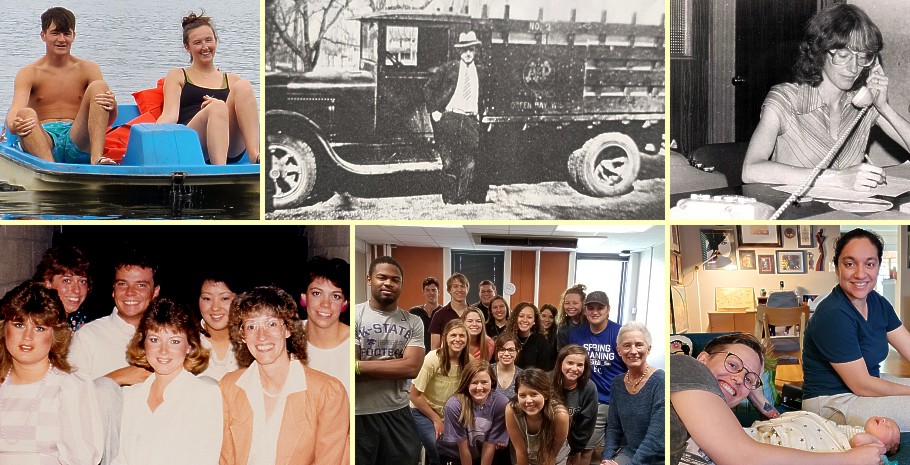Kansas Snapshots by Gloria Freeland - August 30, 2024
Staring out the window
The past two weeks, our friend Jan's grandchildren have been visiting. Courtney is a teacher and Sam is currently coaching while
completing his degree. With these two teachers thrown together with this recently-retired professor and husband Art, who taught for
20 years, it is not hard to guess what topic frequently arose.
But as anyone in the profession can testify, along with the mechanical aspects of a course - motivating students, grading
papers, giving lectures, and so on - there is the ever-present dilemma of what exactly to teach to prepare students for the future.
At one time, the elementary school classroom seemed somewhat insulated from this problem as there was a general understanding that
reading, 'riting, and 'rithmetic - the three Rs - underpinned all other subjects. But the advent of computers has even drawn into
question how subjects such as writing should be handled. Should precious hours be spent learning cursive letters when the majority
of writing today is executed with some sort of keyboard? Even if the answer is "yes," typing is certainly an important skill and the
time to learn it means other topics once seen as essential have to be sidelined.
And what about talk-to-text technology? It may one day call into question the importance of keyboarding. It seems we just
identify a problem and start to think about how to address it, only to find that the nature of the situation is already changing.
This problem is hardly unique to the schoolroom. Teachers and parents have a lot in common. Every parent is a teacher, and what
parent doesn't struggle with the job?
Faced with how to raise our children, most of us will leaf through our mental book of memories back to the chapter titled "When I
was Young" for guidance. If we felt pleased with our growing-up years, it is only a short step to use what we find in that chapter
as a blueprint for our own parenting. If those times were deemed less than what they might have been, we may instead use them to
purposely plot a compensatory course.
But this path has problems similar to the teacher who only wants to teach what he or she did in the past. Daughter Mariya was - and
is - a voracious reader. Naturally, this made us quite pleased. But we were less certain about the hours she spent watching shows
focused on fantasy worlds like "Star Wars" or "Xena."
Now, she works at Kansas State University and teaches a course on how to convert fictional stories into film. What we saw as her
"wasted" time became part of her professional life - something we never saw coming.
One day, husband Art and his mom were chatting across the kitchen table. Donna shared that when Art was young, it bothered his dad
that so many of the summer's beautiful days found his son in the basement working with the electrical things that captured his
interest. It seemed to Tom that Art should have been out playing baseball as kids had when he was young.
But Donna reminded Tom that he had started working at age 12, hauling goods with horses and a wagon for a local company, and how
much he enjoyed it and the money he earned. She noted that had led directly to almost every job he had later in life.
Art started working when he was a year older than his dad was when he began, but in electronics doing repair work. Later, in a touch
of irony, when Tom retired from trucking and Art went on to another job, Tom took over his son's repair business, using the skills he
had learned from Art.
When I was teaching, I frequently organized my journalism classes so we could work on what I called "real world" projects - stories
that could be immediately published in newspapers or broadcast on TV or radio. This worked well, and many of those stories were
subsequently published or broadcast.
A parent taking a son or daughter to work might provide a similar experience, allowing a youngster to see what life looks like from
an adult's point of view. However, it's unlikely to be very effective if the child's interests differ greatly from the parent's.
But while these experiences may help a youngster transition into adulthood, they won't address the problem of what skills they might
need in 10 or 20 years as an employee or how to be a parent raising their own teenagers in a world almost certainly different from
the one they were brought up in. Those problems may require re-educating themselves as they go and as they grow.
Since Courtney is a physical education instructor, she has already thought about how her work will change when she is no longer able
to do some of the things her body now handles with ease. Sam is still focused on where he will begin his professional life. Neither
is married or has children, so they have yet to face any parenting challenges. Mariya and wife Miriam have recently adopted, so they
have now begun that phase of life.
There is no way of escaping the fact that whatever choices they make, there will be errors. This situation reminded me of an ad I
once saw for a truck-driving school. It read, "The teacher told me no one would ever pay me for looking out the window." While
encouraging a student to pay attention is likely to be needed at times, staring out the window from time to time to assess what is
coming and making appropriate course corrections will almost certainly be required.
